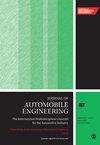基于纵横耦合动力学的履带式车辆能耗特性定量研究
IF 1.5
4区 工程技术
Q3 ENGINEERING, MECHANICAL
Proceedings of the Institution of Mechanical Engineers Part D-Journal of Automobile Engineering
Pub Date : 2024-07-25
DOI:10.1177/09544070241264874
引用次数: 0
摘要
本文提出了一种基于纵横耦合履带式车辆动力学模型的能量计算方法,用于定量研究越野条件下履带式车辆的能量产生和耗散。履带式车辆在不平整路面行驶时,悬架阻尼元件和地面粗糙度引起的附加行驶阻力会消耗部分行驶功率。研究并比较了履带式车辆在不同速度、不同路况和不同驾驶条件下的能量消耗分布。结果表明,路面粗糙系数越大、行驶速度越高、驱动力越大,悬架减震器和附加行驶阻力消耗的能量占总能量消耗的比例就越大。路况对履带式车辆能量消耗分布的影响优先于履带式车辆的速度,而驱动力的影响则因速度变化而在内部产生。本文章由计算机程序翻译,如有差异,请以英文原文为准。
Quantitative research on the tracked vehicle energy consumption characteristics based on the longitudinal-vertical coupling dynamics
In this paper, an energy computation method is proposed based on the longitudinal-vertical coupling tracked vehicle dynamic model to quantificationally study the energy generation and dissipation for tracked vehicles under off-road conditions. When the tracked vehicle drives on uneven road, the suspension damping components and the additional driving resistance caused by ground roughness consumes part of the driving power. The energy consumption distributions of the tracked vehicle under different speeds, different road conditions and different driving conditions are investigated and compared. The results indicate that a larger road roughness coefficient, a higher travelling speed and a greater driving force will make the proportions of energy consumed by the suspension dampers and the additional driving resistance to the total energy consumption larger. The influence of road conditions on the energy consumption distribution of the tracked vehicle takes precedence over the tracked vehicle speed and the effect of the driving force is internally due to speed changes.
求助全文
通过发布文献求助,成功后即可免费获取论文全文。
去求助
来源期刊

CiteScore
4.40
自引率
17.60%
发文量
263
审稿时长
3.5 months
期刊介绍:
The Journal of Automobile Engineering is an established, high quality multi-disciplinary journal which publishes the very best peer-reviewed science and engineering in the field.
 求助内容:
求助内容: 应助结果提醒方式:
应助结果提醒方式:


